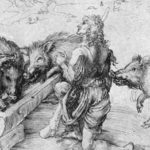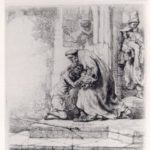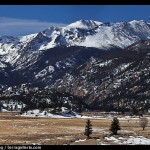With weary steps he trudged homeward, the twin burdens of leadership and famine weighing on his shoulders. Yet another shepherd had left, weary of the near-constant attacks by wolves and lions. Their normal prey—herds of deer and wild goats—had been decimated by the drought, forcing the predators to brave the slings of the increasingly-wary shepherds. But the hyper-vigilance took its toll, too, and many of the hired hands simply walked away, seeking respite from both sun and battle.
Yet hope grew with each passing day. The rainy season so long absent was near, and reports from the west had often included signs of increasing clouds. He had even seen a few himself when gazing toward the unseen sea. Passing tradesmen, with their stories of adventure and excitement, had made him wistful for the same. But his home was here, his father was here, his responsibility was here.
The evening shepherds on their way to the fields were silhouetted by the sun as it dipped into the distant Jordan River valley. They were just slipping on their outer cloaks against the gathering dark and cold as he came upon them. Their voices were unusually animated, but in a brief space between words, a breeze from the east carried the faint music of … celebration? He asked what it was about.
“Your brother has returned!”, said one with unmasked wonder.
“They’re starting to party!”, said another. “They even butchered the fatted calf!”
Brother? Returned? He stood staring after them as the shepherds hurried on their way, then he stared down the path toward home. The old anger rose again in his heart. Venomous words gathered in his throat as he started once again, his pace quickening with every step until he was almost running. More than once he stumbled over an unnoticed stone as the blinding resentment returned.
Suddenly he was outside the house, his whole body shaking with adrenaline and the anticipated confrontation. The pungent aroma of leeks and peppers mixed with roasting beef and insulted his nostrils. Joyful sounds of lutes and lyres, cymbals and drums, struck discord in his now-raging breast. A servant passing just inside the window noticed him—noticed the reddened face—and found his master.
“My son! Come celebrate! Your brother is home!” The old man came running, as breathless in his enthusiasm as the son in his anger. His brow glistened in the lamplight, wet with the perspiration of the dance.
“Brother? I have no brother!” Spittle flew from his lips, spraying his father’s face and tunic. “That lech is dead to me – dead to you!”
“Yes, he is dead – was dead. But he has returned. He lives again!”
“Yes, he lives – lives with whores and rakes! He lived it up on your hard-earned money. What he didn’t throw away on women, he guzzled until he awoke in his own vomit. You’ve heard the stories as well as I have. He dragged your good name through the mud and dung and threw away your life’s work.”
The father looked down in shame-filled remembrance. A tear coursed down into his beard, mingling with the spit that still clung there. He knew all too well the bitter truth of his son’s words, and gathering both thoughts and feelings, he quietly acknowledged that truth. “Yes. He did.” Then, looking up again, he continued. “Yes, he shamed me, humiliated me. He buried me that day: told me I might as well be dead. But that’s not the half of it.”
“And this is how you reward him?”, the son interrupted, anger rising with his father’s admission. “You squander the fattened calf just as he squandered your estate? And here I’ve worked for you—slaved for you—all these years and you’ve done nothing for me! I’ve done everything you’ve asked, never left your side. I even did your work while you sat all day on that rock looking for him. And you never so much as offered a goat for me to enjoy with my friends.” Wrath and spit dripped from his mouth.
“Yes, you have been with me. You have been faithful and wise and industrious. You have managed the flocks far better than I could have in this drought. You have even managed to increase them; no one does that in a famine! You saved us. And I have been lost these past months – as good as dead myself. But your brother was dead, too. And his was a death worse than death itself. Like Cain of old, he killed another but was condemned to walk among the living. The stench of death clung to him, overpowering his drunkenness, his vomit … even the pig slop. The shame he brought to me hung from his shoulders everywhere he went; as he lay naked with each prostitute, the one garment he could not remove was that shame.”
“He deserves the pigs!” The son spat.
“Perhaps. You said you slaved for me these years. That is all your brother has asked now to do: to live here as a servant, to sleep in their quarters and eat their meager portions. But he is no servant, he is a son. My son. My blood flows in his veins just as it flows in yours. And today he has come home. Today he has come alive.
“If you would be a slave, then I free you from all obligation. If you, like your brother, would be free to live as you wish … all I have is yours. But you are no slave in my eyes. You are my flesh and blood, my son – my dear son – my first-born. And I love you, just as I love your brother.
“Come. Eat. Dance. Celebrate. Rejoice in resurrection.”

 (This is Part 2 in a story of the prodigal son.
(This is Part 2 in a story of the prodigal son.  It wasn’t hard to leave that day. The conversation was awkward—”Dad, I want my share. Now, please.”—but walking away wasn’t hard. There wasn’t much to take; less to leave behind. He’d never fit, anyway. The work, the animals, the quiet but grueling life of a nomadic sheepherder. Adventure called, and the city they’d passed two days earlier. No, it wasn’t hard to leave that day.
It wasn’t hard to leave that day. The conversation was awkward—”Dad, I want my share. Now, please.”—but walking away wasn’t hard. There wasn’t much to take; less to leave behind. He’d never fit, anyway. The work, the animals, the quiet but grueling life of a nomadic sheepherder. Adventure called, and the city they’d passed two days earlier. No, it wasn’t hard to leave that day.